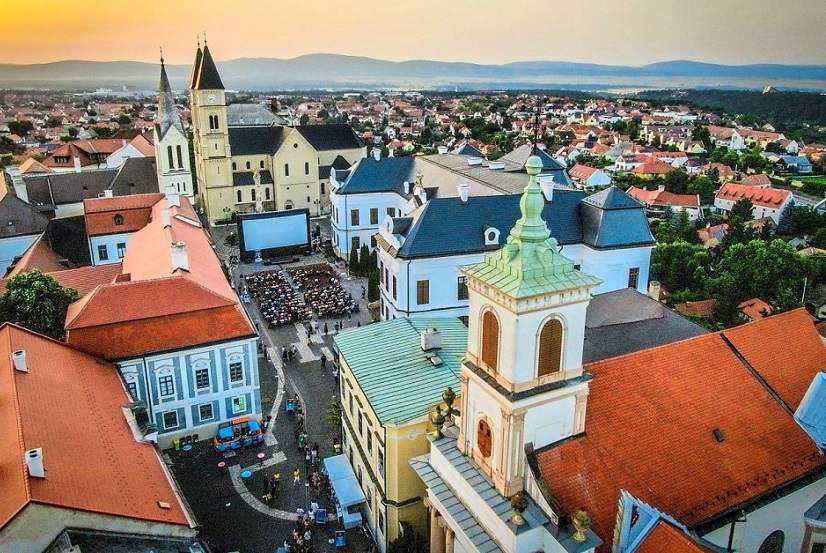In 2023, the European Capital of Culture title will be awarded to three new European cities or regions: Timișoara in Romania, Elefsina in Greece and Veszprém-Balaton in Hungary.
Sparkling diversity in Romanian Timisoara, music and wine in Hungarian Veszprem and mysteries from the legendary Greek Eleusis – that’s what the Capital of Culture year 2023 will bring.
More than 50 events are planned in Timisoara alone for the opening from February 17th to 19th – including the opening of a garden on the central Opera Square that has been announced as “vertical”. There will also be a lot of music from a wide variety of genres, including the Ukrainian hip-hop musician Alyona Alyona and traditional Roma music. After that, there should be an average of 30 events per week. Highlights include: major exhibitions of works by Romanian sculptor Constantin Brancusi (1876-1957) and Romanian-born surrealist painter Victor Brauner (1903-1966).
A splash of color from Timisoara and an ambitious cultural promoter is Dominic Fritz, who has been mayor here since 2020 – born in the Black Forest, political scientist, formerly active in Bündnis 90/Die Grünen, ex-speechwriter for former Federal President Horst Köhler. In his own words, the 38-year-old simply “fell in love with this city” while working as a volunteer in a children’s home in Timisoara in 2003. “Temeswar is much more European than the village I grew up in because it’s much better at dealing with diversity, multilingualism and the juxtaposition of ideas,” enthuses Fritz in conversation with journalists.
Fritz’s heart is on the “Wege der Revolution” project, which is intended to commemorate the popular uprising of 1989, but which, like so many other plans, will not be finished in 2023. The reason for the delay is domestic politics: Fritz belongs to the eco-liberal opposition party USR, but the capital Bucharest is governed by bourgeois and social democrats. This resulted in obstacles, for example due to blocking of funds, Fritz complains. Nevertheless, he hopes that the Capital of Culture year will give him “new impetus” that he can take with him later.
Culture at Lake Balaton in Veszprem
Gyula Porga, mayor of Veszprem in western Hungary, is also hoping for momentum for tourism. At the opening of the Capital of Culture year, there will be a big spectacle on January 21st, under the name “Veszprem-Balaton 2023”. Balaton is the Hungarian name of Lake Balaton, just a few kilometers from Veszprem. “Capital of Culture means finding cultural answers to the challenges of the time,” said Porga in an interview with journalists. As a problem he named the emigration of young people and the fluctuating added value of the tourism magnet Lake Balaton, which is limited to a few summer months. With culture, on the other hand, you can make yourself attractive all year round.
The city with 60,000 inhabitants is attractive simply because of its location. It rises on five hills, between which meanders the river Sed. The town center from the 18th and 19th centuries conveys a sense of homeliness. The renovation of the imposing castle on a mountain should be completed by early 2023, at least on the outside. So far, Veszprem has been able to position itself nationally with music festivals – from classical to jazz and choral music to street music. Music should also set the tone in the Capital of Culture year – as well as gastronomy and wine: some top wines are pressed on the hilly north shore of Lake Balaton.
Eleusis wants to step out of the shadow of Athens
“Mysteries of Transition” is the motto of the Athenian suburb of Eleusis (or Elefsina). Cultural director Michail Marmarinos promises an “unprecedented variant of the European Capital of Culture institution”. The opening ceremony is scheduled for February 4th. Eleusis, with around 30,000 inhabitants today, has always been connected to the Greek capital, which is around 20 kilometers to the east – and has always stood in its shadow. Efforts are now being made to free oneself from this marginal situation and to become independent.
The highlight of the celebrations is the scenic implementation of Johannes Brahms’ “German Requiem” as a “Human Requiem” by director Jochen Sandig and the Berlin Radio Choir. It is scheduled to be performed at the ancient site in late September 2023. The Austrian director David Haneke is to conceive a film based on recordings of the concert.
The staging reflects what Eleusis stood for in ancient times and what the motto “Secrets of Transition” of the Capital of Culture 2023 is all about, said the organization’s head of culture, Michail Marmarinos, of the dpa. In ancient times the “Mysteries of Eleusis” took place there, a kind of secret cult with which the rebirth of nature was celebrated every year. The rites then attracted thousands of Athenians who made pilgrimages to the city. One hopes for a rush of visitors again.
Eleusis experienced its last heyday in the 19th and early 20th centuries. As the breadbasket of the region and because of the port, it was one of the most important industrial centers in Greece. Shipbuilding, cement factories, manufacturing and the food industry were in full swing. But then came the downfall: Piraeus and Athens absorbed almost all branches of the economy. The port of Eleusis became a graveyard for ships. Dozens of the wrecks remain today. This is exactly what the city now wants to overcome as European Capital of Culture. Will it succeed?
Source: https://newsingermany.com/





Comments are closed for this post.